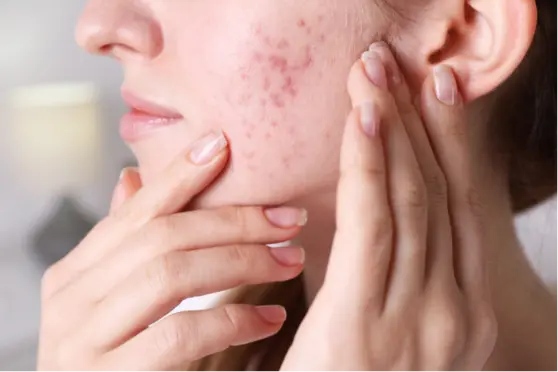Acne Scar Treatment
What is Acne Scar Treatment?
Acne scars are the result of inflammation from acne blemishes, where the acne pore swells and a breakdown occurs in the wall of the pore. While some blemishes heal quickly and leave shallow scars, others can cause deeper scars if the contents spill into the surrounding tissue.
Available Treatments for Acne Scars
-
Dermabrasion: This common treatment uses a wire brush or wheel to deeply exfoliate the top layer of the skin, effectively improving the appearance of facial scars.
-
Chemical Peels: Strong acids are used to remove the top layer of skin, helping to reduce the appearance of deeper scars.
-
Laser Resurfacing: This treatment removes the top layer of skin and typically has a faster healing time compared to other resurfacing methods.
-
Fillers: Fillers can be injected under the skin to fill in depressed scars, using materials like collagen or your own fat.
-
Microneedling: This newer treatment uses a needle-studded roller to puncture the skin, stimulating collagen production as it heals.
-
Injections: Medications can be injected into raised scars to soften and flatten them, usually as a series of treatments.

Need Help
Frequently Asked Questions about Acne and Scars
Here are some commonly asked questions about acne, its consequences, types, treatments, and prevention.
1. What are the consequences of untreated acne pimples?
Untreated acne can lead to lifelong scars. While it is not life-threatening, untreated acne can be upsetting and disfiguring, and in severe cases, it can result in serious and permanent scarring.
2. Why are acne scars common?
Acne scars are caused by the inflammation of acne blemishes. When the acne pore swells and the wall breaks down, it can result in shallow scars or deeper scars if the blemish contents spill into surrounding tissue.
3. What are the types of acne scars?
The types of acne scars include:
- Ice-pick scars: Deep, narrow, pitted scars.
- Rolling scars: Broad depressions with sloping edges.
- Boxcar scars: Broad depressions with sharply defined edges.
- Atrophic scars: Flat, thin scars or depressed scars (anetoderma).
4. What are the treatment options for acne scars?
Treatment options for acne scars include:
- Salicylic acid to clear pores and reduce inflammation.
- Dermabrasion, chemical peels, laser resurfacing, fillers, microneedling, and injections.
5. How long do mild acne scars last?
Mild acne scars typically fade within 3-6 months. However, deeper scars may require treatment for improvement as they result in permanent skin damage.
6. What is the most severe acne scar to treat?
Ice-pick scars are the most difficult to treat due to their depth and narrowness, making them challenging to fill or exfoliate.
7. What are some home skincare methods for acne scars?
Using sunscreen helps limit the contrast between scarred and unscarred skin. Creams containing azelaic acid or hydroxyl acids may also be beneficial.
8. How can I prevent acne scars?
Control acne as soon as possible. Begin treatment immediately and consult a doctor if over-the-counter treatments aren’t effective. Quick action helps minimize breakouts and prevents the formation of scars.
What Our Clients Say
I recently visited for a skincare routine and hair scalp checkup, and I had an excellent experience. The doctor provided a thorough examination, took the time to explain every detail, and doctor offered personalized advice tailored to my needs. I highly recommend this clinic for anyone looking for professional and caring service.
Very nice and friendly doctor. I came for acne prone and tanned skin issue. There is lot of improvement in my skin condition with her Laser treatment. She listens to all our queries and treats accordingly. I would recommend her. Thank you very much Dr. Sirisha Yanegalla
Had a very satisfying treatment for Acne with Dr Sirisha. Started feeling better from the very first session. Dr Sireesha was very friendly and clarified all the doubts with a smile. Never had to wait for consults.Always on time. Thank you Doc. Must consult for those looking for Best dermatologists.
The best clinic for hair removal treatment. Thick body and facial hair was my greatest worry and i did a lot of research in finding a clinic with a good doctor and an advanced laser machine. Even after reading and knowing a lot about the technology i was apprehensive during my first visit. Dr sirisha took time to make me understand all the details about the process and the way she explained made me confident and comfortable. After 3 sessions now i hardly have hair. Appointments are well managed. Clinic is very neatly maintained.
I Strongly recommend Dr. Sirisha Yanegalla, consulted her regarding acne issue. She patiently listens to all our concerns and then explains everything with detailed information. With in just 4 sessions there were no active acne and my skin improved a lot. Even the staff were very polite, never had to wait for the consultation they are always on time. 10/10 recommend Dr.Sirisha Yanegalla!!
Doctor is excellent in explaining and doing the needful treatment. In this clinic, I felt the people are Not money minded like you see in most of the places. Here only the treatment is given which is needed for you, Not like convincing to provide every service available there to get more money which happens in most of the places.
Had a wonderful experience. The doctor is very knowledgeable, polite, friendly and easy to talk to. I would highly recommend this clinic as I have personally seen good results for my skin treatment.
Contact Us
Send A Message
If you want to ask anything just fill in the form below and send us.
